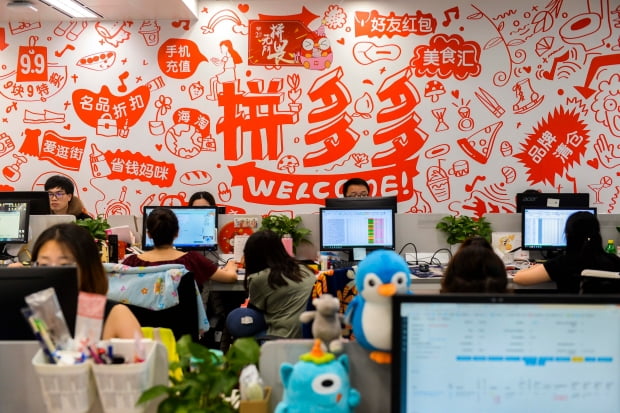
Controversy over the excessive working practices of some Chinese companies is growing as an employee at Pindudou, China’s third largest e-commerce company, dies suddenly. /Photo = AP
Amid controversy over the harsh working conditions of Chinese companies due to the sudden death of an employee in China’s third largest e-commerce company Pindoudu, a company in Dongguan, Guangdong Province, forced employees to pay a fine for going to the bathroom more than once. Climbed.
According to the Hong Kong South China Morning Post (SCMP) on the 6th, Anpu Electronics in Dongguan is imposing a penalty of 20 yuan (about 3,400 won) from the second time an employee goes to the bathroom during working hours in the name of enhancing work efficiency. The company also requires you to report to your boss when you go to the bathroom.
This measure was made public throughout China after a total of seven employees were fined on the 20th and 21st of last month, and the facts were recently posted on social media. The Dongguan city public security launched an investigation into the company, and the Dongguan city government confirmed that the regulations were illegal and forced the company to return the fine.
The company explained that it was not required to pay a fine every time, but was deducted from the monthly bonus, and it was introduced because of employees who smoke in the bathroom during working hours. A company official said, “The company is also in trouble because of the lazy workers,” and “I gave attention to the target employees several times, but they did not get better, so I took such measures.”
Public opinion in China is diverging. One netizen argued, “If some employees go to the bathroom too often and waste a lot of time, the productivity of the company will inevitably decrease.” However, many blamed the company. There were many opinions, “To increase productivity, you also need compensation. If you only increase the limit, you cannot increase concentration.”
Netis, a Chinese internet conglomerate, even blocked internet services in toilets in 2018. However, employees avoided these restrictions by playing dramas or games they had received in advance.
Besides restroom restrictions, Chinese companies have come up with other measures. Shanghai-based Qiu Being Consulting introduced a rule in August last year stating that an employee can be fired if it is caught three or more times throwing a free lunch provided by the company out of the company building.
In the same month, Shanghai Banmu Furniture asked a female saleswoman who took parental leave for one year to hand-write a business diary of 4,800 Chinese characters, and apologized for controversy. The company required employees to pay a fine of 50 yuan for each letter heard by the employee, 100 yuan for each repeated sentence, and 500 yuan for exceeding the deadline. The employee quit the company.
In addition, a company in Hangzhou is being accused of monitoring employees’ working attitudes with’smart cushions’. The company recently provided cushions to all employees, which were used not only to detect heart rate and sitting position, but also to determine how long they were sitting in a chair during working hours. If the user was not moving for a long time, the cushion triggered an alarm.
The data collected by the cushion is also accessible to employers, criticizing the company for illegal surveillance of employees. According to Pong Hwang Mang, when an employee of this company encountered an employee in the human resources department in an article posted on the Internet, he asked,’Why do you leave your desk from 10 am to 10:30 every morning? He said that the conversation was cool when he heard that the boss said, “Be careful because the bonus can be reduced.
Meanwhile, on the 5th, a 23-year-old employee of the e-commerce company Pinduo announced on the 5th that he lost consciousness on the way home at 1:30 am on the 29th of last month in Urumqi, Xinjiang, and died after 6 hours.
The woman, who joined the company in 2019, worked on a food ingredient purchase platform in Pindoudoo, and after working late at night, she was reported to have suddenly collapsed after leaving work with a colleague. The woman’s death rekindled a heated debate over the overtime culture.
In China, the new word ‘996’ appeared in 2019. It refers to working at 9 am, leaving work at 9 pm, and working 6 days a week. Currently, office workers are complaining that “not 966, but ‘715 age”. 715 means you work 7 days a week, 15 hours a day.
Beijing = correspondent Kang Hyun-woo [email protected]
